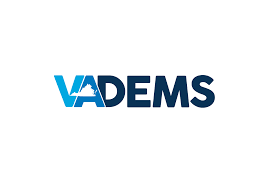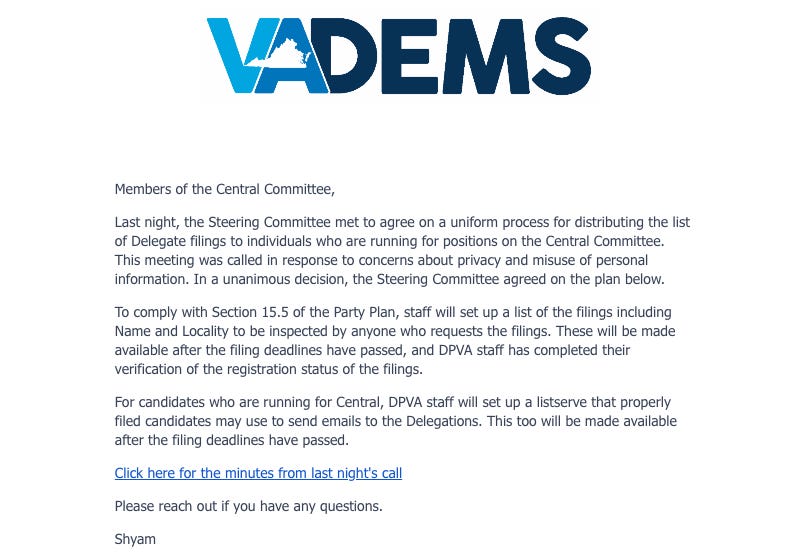Dispatch from DPVA Steering: Whitley Undermined, Transparency Eschewed
Commentary from Josh Stanfield
This is a daily newsletter covering Virginia politics from top to bottom. Please consider becoming the ultimate political insider by supporting non-partisan, independent news and becoming a paid subscriber to this newsletter today.
(This is commentary from Josh Stanfield. He is a member of the second congressional district Democratic Committee and the DPVA Central Committee.)
Commentary: Dispatch from DPVA Steering - Whitley Undermined, Transparency Eschewed
Thursday night, Democratic Party of Virginia (DPVA) volunteers and activists - eyes glued on an inactive video stream - feverishly clicked “refresh” with a diminishing hope of watching their Steering Committee deliberate. The DPVA Steering Committee, the preeminent governing body perched at the apex of the state party hierarchy, had called this snap 8 pm meeting to address the election process for the new DPVA Central Committee.
But only minutes after the meeting began, the Steering Committee voted to enter Executive Session, the video feed was cut, and Democrats around the state were treated to over an hour and a half of nothing.
Less than a week before, activist group Network NOVA hosted an online workshop on the DPVA Central Committee election process. We discussed the current reorganization of the state party: on either February 19, 26, or March 5, each congressional district (CD) has a convention to elect 20 representatives to four-year terms on the DPVA Central Committee. Later this year, this new Central Committee will meet to elect the next state party chair, vice chairs, and other officers. This ongoing process, therefore, determines the composition of Democratic Party of Virginia leadership for the next few years.
A core concern of the workshop was the unfair distribution of sign-up lists for convention delegates. Our conventions are totally digital this year. Folks who sign up to participate in these CD conventions do so via Google forms controlled by state party staff. As sign-ups have come in, and before deadlines hit, these lists have been distributed selectively to CDs and local party leaders, providing them with the ultimate competitive advantage in convention politics: early and exclusive knowledge of how many folks have signed up, who they are, how to contact them, and where more or less competition is necessary.
I haven’t heard anyone dispute that this is happening.
At the end of our workshop, Democratic Party of Virginia Executive Director Andrew Whitley unmuted his mic and spoke to the digital crowd of hundreds. Having heard the concerns about lists, Andrew told the crowd that we could get the lists from him by simply asking (starting at [1:28:40] here).
Andrew Whitley’s open commitment to transparency and full participation assuaged the concerns of many Democrats at the event; to be sure, people started requesting sign-up lists for their CD conventions. But in less than a week, the Steering Committee showed Andrew who calls the shots and who butters his bread. The Party Plan, after all, vests the power to hire and fire party staff in Chairwoman Susan Swecker with approval from the Steering Committee.
For those Democrats who endured 1.5 hours last Thursday night and observed the resurrection of the video feed, the Committee’s subsequent edicts were confusing and - to some - infuriating. There was no proposed solution to the unfair and asymmetrical distribution of sign-up lists during the convention process, even though an easy and obvious one exists: make the lists available to everyone who has filed and wants access, ASAP, to mitigate the ongoing inequity.
Instead, the Steering Committee announced concerns about privacy and misuse of data, heavily restricting campaigning for the Central Committee in a manner more closed, controlled, and confusing than any I’ve seen in seven years of participation in the DPVA.
We’ve already run multiple statewide and congressional district party elections digitally during the pandemic; in 2020, for example, I wrote a piece in Blue Virginia highlighting some potential concerns. And in these processes, candidates for positions have always had some form of access to the names, localities, and contact information of the convention voters. Now, however, candidates will need to email any campaign missives to a DPVA listserv that reroutes messages to the voters of their particular convention. Candidates will only have the names and localities of their voters - no contact information.
Using this listserv, can you contact just a segment of voters in your convention? Can you campaign to folks in just one locality of your district? Who administers the listserv? Can party leaders or longtime members, who may already have contact information for local Democrats in their files, use that information for campaigning?
I can’t get answers to these questions, and despite the 1.5 hour secret Steering meeting, my CD1 Committee Chair Matt Rowe has “personally never used a listserv before, so [he] can't speak to what the steps/procedures are yet.” Other Steering Committee members have told me, since they were in Executive Session, they’re under an effective gag order not to discuss the details or rationale behind their decision. Presumably, they’ll use this system to elect our party officers later in the year, too.
So let’s be real: if privacy were truly a concern, DPVA staff creating this year’s sign-up Google forms would’ve taken about 60 seconds to add a box: “Check here if you’d like your contact information to remain confidential.”
That never happened.
Instead, when existing party leadership were caught sharing data unfairly in multiple congressional districts - and the DPVA Executive Director sided with fairness and transparency - the institutional fist came down. Steering had to meet. And it had to be in secret.
I’ve been told it’s naive to expect fairness in party conventions of all places, that raw power, loyalty, patronage, and institutional inertia rule these spaces. I continue to believe, however, that a party rhetorically committed to voting rights, to free and fair elections, and to the democratic process must reflect those commitments in its own internal processes.
If DPVA leaders insist on straying from these principles and further eroding trust in the party, they should at least do so in the sunshine, for all to see, and with full expectation of being held accountable.






